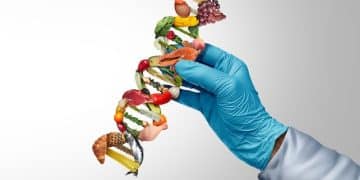Gut Microbiome and Personalized Nutrition: What’s Coming in 2025?

In 2025, personalized nutrition plans will be significantly influenced by the latest research on the gut microbiome, leveraging advanced diagnostics and tailored dietary recommendations to optimize individual health outcomes.
Are you ready to discover how your gut’s unique ecosystem will revolutionize your diet in 2025? Latest research on the gut microbiome is set to redefine personalized nutrition plans, and it’s closer than you think.
Understanding the Gut Microbiome Revolution
The gut microbiome, the complex community of microorganisms residing in our digestive system, is increasingly recognized as a key player in overall health. As we approach 2025, advancements in research are poised to transform our understanding of the gut’s role in personalized nutrition.
This section delves into the basics of the gut microbiome and highlights how its influence is expanding into various domains of health and nutrition.
What is the Gut Microbiome?
The gut microbiome consists of trillions of bacteria, fungi, viruses, and other microorganisms that live in the digestive tract. This community plays a crucial role in digestion, nutrient absorption, immune function, and even mental health.
Why is Gut Microbiome Research Important?
Recent studies have uncovered links between the composition of the gut microbiome and a wide range of health conditions, including obesity, diabetes, heart disease, and autoimmune disorders. Understanding these connections is essential for developing targeted nutritional strategies.

- Improved Diagnostics: In 2025, advanced diagnostic tools will enable comprehensive profiling of an individual’s gut microbiome, providing detailed insights into its composition and function.
- Personalized Dietary Recommendations: Based on the microbiome profile, personalized nutrition plans can be tailored to promote the growth of beneficial bacteria and address imbalances.
- Enhanced Health Outcomes: By optimizing the gut microbiome through targeted nutrition, individuals can experience improvements in digestion, immunity, weight management, and overall well-being.
In summary, the evolving research on the gut microbiome is set to revolutionize personalized nutrition by providing precise, data-driven dietary recommendations tailored to individual needs. This shift promises to optimize health outcomes and promote overall well-being.
Advanced Diagnostic Tools for Gut Profiling in 2025
Advancements in diagnostic technology are crucial for understanding the complexities of the gut microbiome. By 2025, expect to see a surge in sophisticated tools that offer detailed insights into the composition and function of individual gut microbiomes.
This section will explore the cutting-edge diagnostic methods that will likely be available and how they will shape personalized nutrition plans.
Next-Generation Sequencing (NGS)
NGS technologies allow for rapid and cost-effective sequencing of microbial DNA, providing a comprehensive overview of the types and abundance of bacteria present in the gut. This method is becoming increasingly accessible and accurate.
Metabolomics
Metabolomics involves analyzing the metabolites produced by the gut microbiome, offering insights into the metabolic activities and functional capacity of the microbial community. This data can reveal how the microbiome is impacting host health.
- Real-Time Monitoring: Wearable sensors and ingestible devices will enable real-time monitoring of gut health, providing continuous feedback on the impact of dietary interventions.
- AI-Powered Analysis: Artificial intelligence algorithms will analyze complex microbiome data to identify patterns, predict responses to dietary changes, and personalize nutrition plans.
- Accessible Testing: At-home testing kits will become more sophisticated and user-friendly, allowing individuals to easily collect and submit samples for microbiome analysis.
As diagnostic tools become more advanced, personalized nutrition plans will be based on precise and comprehensive data, allowing for more effective and targeted interventions. This technological progress is paving the way for a data-driven approach to gut health.
Tailoring Dietary Recommendations Based on Microbiome Data
The ability to analyze individual gut microbiomes opens up exciting possibilities for tailoring dietary recommendations. Instead of generic advice, nutrition plans can be customized to promote the growth of beneficial bacteria and address specific imbalances.
This section outlines how microbiome data will be used to create personalized nutrition strategies that optimize gut health.
Prebiotics and Probiotics
Prebiotics are non-digestible fibers that feed beneficial bacteria in the gut, while probiotics are live microorganisms that can directly colonize the gut. Understanding the specific needs of an individual’s microbiome can guide the selection of appropriate prebiotics and probiotics.
Personalized Food Choices
Based on microbiome data, individuals can receive tailored recommendations for specific foods that support gut health. This may involve increasing the intake of fiber-rich foods, fermented foods, or specific types of vegetables and fruits known to promote beneficial bacteria.

- Targeted Supplementation: In addition to dietary changes, targeted supplementation with specific nutrients or microbial strains can help address deficiencies and imbalances in the gut microbiome.
- Dynamic Adjustments: Personalized nutrition plans will be dynamically adjusted based on ongoing monitoring of the gut microbiome, ensuring that dietary recommendations remain effective over time.
- Integration with Lifestyle Factors: Dietary recommendations will be integrated with other lifestyle factors, such as exercise, stress management, and sleep, to promote holistic gut health.
By tailoring dietary recommendations based on microbiome data, personalized nutrition plans can effectively promote gut health, leading to improvements in digestion, immunity, and overall well-being. This approach represents a significant shift from one-size-fits-all dietary advice to customized strategies.
The Role of Artificial Intelligence in Personalized Nutrition
Artificial intelligence (AI) is set to play a transformative role in personalized nutrition by analyzing complex microbiome data and generating tailored dietary recommendations. AI algorithms can identify patterns, predict responses to dietary changes, and optimize nutrition plans for individual needs.
This section explores the applications of AI in personalized nutrition and highlights how AI is enhancing the effectiveness of dietary interventions.
Machine Learning Algorithms
Machine learning algorithms can analyze vast datasets of microbiome profiles, dietary intake, and health outcomes to identify correlations and predict the impact of specific dietary interventions. This allows for the development of highly personalized nutrition plans.
AI-Powered Nutrition Apps
AI-powered nutrition apps can track dietary intake, monitor gut health, and provide personalized recommendations based on individual microbiome data. These apps can also offer real-time feedback and support to help individuals adhere to their nutrition plans.
- Predictive Modeling: AI can be used to develop predictive models that forecast an individual’s response to specific dietary changes, allowing for proactive adjustments to optimize health outcomes.
- Automated Analysis: AI algorithms can automate the analysis of complex microbiome data, saving time and resources for healthcare professionals and individuals.
- Continuous Improvement: AI-powered systems can continuously learn and improve their recommendations based on new data, ensuring that personalized nutrition plans remain effective over time.
The integration of AI into personalized nutrition is enhancing the precision and effectiveness of dietary interventions. By leveraging AI, individuals can receive tailored recommendations that are optimized for their unique microbiome and health goals, leading to improved outcomes and a more personalized approach to health.
Ethical Considerations and Data Privacy
As personalized nutrition becomes more data-driven, ethical considerations and data privacy become increasingly important. Protecting individual microbiome data and ensuring fair and equitable access to personalized nutrition services are essential.
This section addresses the ethical challenges associated with personalized nutrition and highlights the measures needed to safeguard data privacy and promote responsible use of microbiome data.
Data Security
Ensuring the security of individual microbiome data is paramount. Robust security measures, such as encryption and access controls, are needed to prevent unauthorized access and data breaches. Individuals should have control over how their data is collected, stored, and used.
Informed Consent
Obtaining informed consent from individuals before collecting and analyzing their microbiome data is crucial. Individuals should be fully informed about the purpose of the data collection, the potential risks and benefits, and their rights to access, modify, and delete their data.
- Equitable Access: Personalized nutrition services should be accessible to all individuals, regardless of their socioeconomic status or geographic location. Addressing disparities in access is essential to ensure that everyone can benefit from advances in nutrition science.
- Transparency: Transparency in the development and implementation of personalized nutrition plans is essential. Individuals should understand the basis for dietary recommendations and have the opportunity to ask questions and seek clarification.
- Regulation: Clear regulatory frameworks are needed to govern the collection, analysis, and use of microbiome data in personalized nutrition. These frameworks should protect individual rights and promote responsible innovation.
By addressing ethical considerations and prioritizing data privacy, personalized nutrition can be implemented in a responsible and equitable manner, maximizing the benefits for individuals while minimizing potential risks. These considerations are crucial for building trust and ensuring the sustainable development of personalized nutrition.
Future Trends and Innovations in Gut Microbiome Research
The field of gut microbiome research is rapidly evolving, with numerous trends and innovations on the horizon. As we look beyond 2025, expect to see further advancements in diagnostic tools, personalized interventions, and our understanding of the microbiome’s role in health and disease.
This section explores the future trends and innovations that will shape gut microbiome research and personalized nutrition in the coming years.
Synthetic Biology
Synthetic biology involves engineering microorganisms to perform specific functions in the gut, such as producing therapeutic compounds or breaking down harmful substances. This technology holds great promise for targeted microbiome modulation.
Phage Therapy
Phage therapy involves using bacteriophages (viruses that infect bacteria) to selectively target and eliminate harmful bacteria in the gut. This approach offers a more precise alternative to broad-spectrum antibiotics.
- Microbiome Transplantation: Fecal microbiota transplantation (FMT) involves transferring the gut microbiome from a healthy donor to a recipient with a dysbiotic microbiome. FMT is being explored as a treatment for various conditions, including recurrent *Clostridium difficile* infection and inflammatory bowel disease.
- Personalized Probiotics: Advances in probiotics research are leading to the development of personalized probiotics that are tailored to an individual’s unique microbiome composition and health needs.
- Integrated Data Platforms: Integrated data platforms that combine microbiome data with other health information, such as genetics, lifestyle, and medical history, will provide a holistic view of individual health and enable more personalized interventions.
The future of gut microbiome research and personalized nutrition is bright, with numerous innovations poised to transform our approach to health and disease. By embracing these advancements and addressing ethical considerations, we can unlock the full potential of the gut microbiome to promote individual and public health.
| Key Point | Brief Description |
|---|---|
| 🔬 Advanced Diagnostics | NGS and metabolomics provide detailed gut microbiome profiles. |
| 🍎 Tailored Nutrition | Personalized diets based on microbiome data to promote beneficial bacteria. |
| 🤖 AI Integration | AI analyzes microbiome data for personalized recommendations. |
| 🛡️ Ethical Considerations | Data privacy and equitable access are crucial for responsible use. |
Frequently Asked Questions
▼
Expect more personalized recommendations, shifting from generic advice to suggestions tailored to your unique microbiome composition, helping you choose foods that foster beneficial bacteria.
▼
Next-generation sequencing (NGS) and metabolomics are pivotal, enabling comprehensive microbial DNA sequencing and metabolite analysis, providing in-depth insights into gut health.
▼
AI algorithms analyze extensive microbiome datasets, pinpoint patterns, and predict the impact of dietary modifications, crafting nutrition plans optimized for individual needs.
▼
Data security and equitable access are paramount. Protecting microbiome data and ensuring services are available to all, irrespective of background, are critical issues.
▼
Expect developments in synthetic biology, phage therapy, and microbiome transplantation, offering targeted microbiome modulation and personalized probiotic solutions based on individual needs.
Conclusion
In conclusion, the latest research on the gut microbiome is poised to significantly impact personalized nutrition plans by 2025, leveraging advanced diagnostics, AI-driven insights, and tailored dietary recommendations to optimize health outcomes. Embracing these advancements responsibly will unlock the full potential of personalized nutrition, leading to improved well-being and a more informed approach to health.





